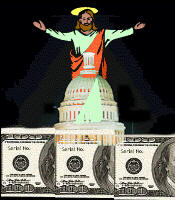 |

 Pay Taxes to the Churches Fundamentalist Social Initiatives Threaten GLBT People All will Suffer: Children, Battered Wives & the Homeless |
|
National Gay & Lesbian Task Force Editorial
What is Meant by Bush's Faith Based Initiatives?
Bush has proposed a major faith-based social services initiative that will provide as much as $8 billion the first year and $80 billion during the next ten years. Some of this money will be in the form of direct federal funds to churches, synagogues and other faith-based institutions. And part of this money will come in the form of federal tax incentives that individual taxpayers may receive when donating to charity. Faith-based initiatives are not altogether new. For generations, religious institutions have been at the forefront of providing care to the indigent and immigrants, and have long played a central role in African American communities. But in the past, government has required that taxpayer-funded services be provided in environments that are not "overtly religious," sectarian or evangelical in nature. Bush's proposals threaten this safeguard. The 1996 punitive welfare "reform" law passed by the Republican-led Congress and signed by former President Clinton enabled some houses of worship to receive tax dollars for delivery of social services. These initiatives were sponsored by former U.S. Senator, now Attorney General, John Ashcroft. The 1996 approach represented a fundamental change in the relationship between places of worship and the federal government. Prior to that year, the federal government would sometimes contract with religious groups to provide delivery of social services, but safeguards were imposed to prevent the "entanglement" between religious institutions and government. For instance, religious institutions receiving government funds would have to create separate, secular nonprofit entities to administer the programs. The 1996 welfare law not only removed this safeguard, it also allowed religious institutions to discriminate in their hiring practices on the basis of religious belief, gender, race and ethnicity, and other factors. Moreover, the 1996 law eliminated safeguards that were intended to prevent recipients from being subjected to unwanted proselytizing, the display of large religious icons in areas where services were provided and other forms of captive-audience religious expression. The Threat to GLBT People
In Texas, where George W. Bush substantially increased funding for religious institutions, one church requires participants in a government-funded welfare-to-work program to study scripture and to "find employment through a relationship with Jesus Christ." (Michelangelo Signorile, Gay.com, Jan. 30, 2001) The state of Texas, which funds the program, subsequently was sued by the American Jewish Congress and the Texas Civil Rights Project. As the American Civil Liberties Union's Lesbian and Gay Rights Project puts it, "If religious groups can get away with using government funds to preach and recruit, lesbians and gay men will pay a heavy price. But we'll hardly be alone. Children, the homeless, battered women, women looking for reproductive counseling, and others will all find that proselytization is now the price of protection." GLBT people also could face the ugly specter of employment discrimination due to George W. Bush's proposals. Under the faith-based initiatives first enacted as part of the 1996 welfare law, religious institutions were exempted from already existing nondiscrimination laws - laws that prevented employment discrimination based on such factors as race or ethnicity or religious belief. Many religious organizations may also decline to comply with local or state laws preventing employment discrimination in the area of sexual orientation - or to voluntarily enact such nondiscrimination guidelines in cities, counties or states that do not have sexual orientation laws on the books. As Salon.com journalist Bruce Shapiro notes, "In both George W. Bush's Texas and John Ashcroft's Missouri, churches claim the First Amendment right to run their religious schools, daycare centers and drug programs free from licensing and performance standards applied to all other agencies in the education or social services arena. Because of the First Amendment, they claim they can discriminate in hiring against gays or women or anyone else routinely protected at secular agencies." An example of this danger was vividly demonstrated by a state-run, faith-based initiative in Kentucky. A Baptist agency which receives $13 million of its annual $19 million in state and federal tax dollars fired a top-notch children's therapist because she was a lesbian. The agency fired her, it said, because as a lesbian, she was incapable of inculcating fundamentalist Christian ideas in the children she was supposed to help, and was a poor role model. The American Civil Liberties Union's Lesbian and Gay Rights Project has filed a lawsuit in federal court. NGLTF on Faith-Based Initiatives Absent adequate safeguards, the National Gay and Lesbian Task Force opposes the use of tax dollars to fund religion-based initiatives. NGLTF believes that such funding potentially violates the First Amendment of the U.S. Constitution. NGLTF also believes that government-funding of pervasively sectarian organizations poses a threat to gay, lesbian, bisexual and transgender social service workers as well as social service recipients. NGLTF further believes that such programs lack accountability in the manner in which funds are spent and clients are served. NGLTF opposes these types of faith-based initiatives for the following additional reasons:
The Texas Record Expanding faith-based initiatives represented a major focus for George W. Bush during his tenure as Texas governor. The results showed an appalling lack of accountability among entities receiving funding and/or easier accreditation standards. One of the early beneficiaries of Bush's policy was a group of homes run by the People's Baptist Church of Corpus Christi. The homes - originally founded by fundamentalist Christian Lester Roloff - were the focus of a heated legal struggle throughout the 1970s and 1980s. The homes were forced to close down in the 1980s, after the U.S. Supreme Court refused to hear an appeal of a lower court ruling that required that the homes be licensed by the state. After the homes closed, they moved to Missouri, where under both Attorney General John Ashcroft and, later, Gov. John Ashcroft, they were not subject to state scrutiny. After Bush was elected Texas governor, however, they returned to Texas and were licensed by the newly created Texas Association of Christian Childcare Agencies (TACCCA), which Bush had created as a way of circumventing existing state licensing procedures for privately run homes for troubled youth. Upon signing the legislation creating TACCCA, Bush said, "We must unleash the compassion of people of faith to help solve the many challenges facing Texas." (Texas Lawyer, Sept. 25, 2000) What happened next, however, is anything but compassionate. According to allegations made in a civil suit filed against the homes, the individuals running them and the state agency that accredited them, three youth were whipped, beaten, denied food and water, and forced to dig a 15-foot pit. A felony charge of unlawful restraint was filed against the then-superintendent of one of the homes, Allen Lee Smith (Corpus Christi Caller-Times, Oct. 5, 2000). A trial date for Smith is pending, in addition to the civil lawsuit. Other problems arose at the San Antonio, Texas branch of a program called Teen Challenge, which has branches across the United States. Teen Challenge, a residential Christian program that relies on faith-based methods to fight drug abuse, was launched in the 1960s by David Wilkerson, author of The Cross and the Switchblade. According to the Texas Commission on Alcohol and Drug Abuse (TCADA), the organization "violated [state] policies, procedures and licensure standards. There were problems with hiring practices, not meeting training requirements for counselors, client grievance procedures, release of confidential records." (Texas Freedom Network report, Jan. 29, 2001) Teen Challenge was also charged with disregarding state standards for the "screening, orientation, treatment and discharge of follow-up clients."
According to the Texas Freedom Network, "As Governor of Texas, George W. Bush aggressively expanded so-called 'charitable choice' programs through a series of executive orders and state laws designed explicitly to expand religious social services. "Governor Bush's original motivation in pushing 'charitable choice' was to exempt two evangelical religious programs from basic health and safety regulations accepted and supported by mainstream religious groups. The two religious programs that provided the impetus for Bush's push for change -- Teen Challenge and the Roloff Homes -- were both in trouble with the state of Texas for employing dangerous treatment practices. Both programs' legal troubles were also taken up as prominent causes by religious right leaders." The Texas Freedom Network concluded, "Bush has publicly defended these programs -- and changed state law to protect their interests -- at the expense quality of care and even public safety." What Others Are Saying American Civil Liberties Union's Lesbian and Gay Rights Project: "In their current form, the president's proposals are a direct threat to lesbians, gay men, bisexuals and transgendered persons all across America. In response to criticism that these new plans blur the line between church and state, the administration is now using more moderate and inclusive rhetoric. But it's the plans, not the pitch, that matters here -- and the plans are dangerous." Rev. Barry W. Lynn, executive director, Americans United for Separation of Church and State: "Bush's plan is the single greatest assault on church-state separation in modern American history. Funneling billions of tax dollars to houses of worship is certain to lead to lawsuits. The First Amendment was intended to create a separation between religion and government, not a massive new bureaucracy that unites the two. People shouldn't have to go to a church they may not believe in to get help from the government. Placing people in need in this kind of position is just plain wrong." Anti-Defamation League: "We strongly believe that every component of your initiative must maintain essential constitutional safeguards for protecting both religious organizations and beneficiaries. Past experience with government and religiously-affiliated organizations working as partners has demonstrated well that these necessary safeguards do not interfere with these organizations' ability to provide excellent service to our country's most needy citizens. These safeguards should: Ensure that no program beneficiary is subjected to unwanted and unconstitutional proselytizing when he or she receives government-funded social services, Ensure that taxpayer money does not fund religious discrimination in the hiring and firing of people who will deliver the services, Ensure that secular alternatives to religiously provided services are readily available, and that those who prefer secular alternatives are made aware of them and have realistic and convenient access to them, Ensure the development of proper firewalls between government-funded services and the core religious activities of a religious organization, so that taxpayer dollars are not channeled into other religious activities of sectarian organizations (as a practical matter, this can best be implemented through religious organizations' establishment of a separate corporate structure which would distinguish a sectarian religious entity from its government-funded social welfare organization), Ensure that program recipients comply with all requirements and restrictions imposed upon all government-funded activity by the Religion Clauses of the First Amendment to the United States Constitution, and Ensure that extremist, terrorist or hatemongering groups are not able to receive government money. Samantha Smoot, executive director, Texas Freedom Network: "Funding religious services with taxpayer dollars has been a lose-lose-lose-lose deal in Texas. Taxpayers lose because they are forced to financially support religious activity, and they get virtually no accountability for how the money is spent. Churches lose, because the government strings that come with government funds threaten their independence. Poor people lose because they may be compelled to practice a faith not their own in order to receive services, and because Bush has exempted many of these programs from basic health and safety practices. In taking taxpayer-funded religion to a national, $8 billion-a-year level, President Bush will make the U.S. Constitution the big loser, because his plan strikes a blow to the very heart of the First Amendment."
Related Links Americans United for Separation of Church and State's report on Bush's faith-based initiatives www.au.org/pr12601.htm Anti-Defamation League's letter to George W. Bush www.adl.org/PresRele/Rel_ChStSep_90/3748_90_bush_letter.html Texas Freedom Network report on "charitable choice" in Texas www.tfn.org/issues/charitablechoice/index.html Salon.com article about John DiIulio, chosen to lead George W. Bush's White House Office of Faith-Based and Community Initiatives www.salon.com/politics/feature/2001/01/31/diiulio/index.html Michelangelo Signorile's article, Christian Soldiers March into the White House content.gay.com/channels/news/signorile/index.html People For The American Way on "charitable choice" www.pfaw.org/caphill/liberty.shtml#charitablechoice |




